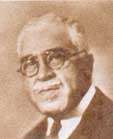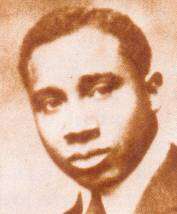
 |
|
The authors of the first Negro spirituals are not known: these were spontaneous, unwritten songs. After the Civil War, African American musicians arranged Negro spirituals, then composed the first Gospel songs. Here are short biographies of some composers. Charles Albert TINDLEY (1856-1933) He wrote several songs and he was the first composer to copyright church songs. He did not intend that his songs should be sung in the formal worship services, but rather on informal occasions. He published a collection New Songs of Paradise, in 1916 His best known songs and arrangements are, “A Better Home”, “Leave It There”, “Stand by Me” (1905), “The Storm Is Passing Over”, “What Are They Doing in Heaven Tonight”, “Nothing Between”, “We’ll Understand It Better By and By”. Harry Thacker BURLEIGH (1866-1949)
He used to listen to his grandfather (a former blind slave who run away and settled in Pennsylvania) sing Negro spirituals and other songs of plantations. He graduated in New York at the Institute of Musical Art, directed by Antonin Dvorak who was influenced by the Negro spirituals when he composed pieces like his Symphony No 5 "From the New World". He arranged a hundred spirituals since 1901. They were adapted for the voices of the artists who had to sing these songs. For example, Paul Robeson used to sing on stage and recorded '` Deep River" that he arranged He published "Jubilee Songs of the United States of America in 1916. John Rosamond JOHNSON (1873-1954)> His father was born free in Virginia. His mother taught school and had knowledge on the European tradition in music. He obtained his musical education in the New England Conservatory, then in London, England. With his brother James Weldon Johnson (1871-1938), a poet writer, he collected and arranged old Negro spirituals. Together with his brother and Bob Cole, he sang secular songs. His best known choral work is "Walk Together, Children" (1915) but he also composed the anthem « Lift Every Voice and Sing ». He served as the director of the Music School Settlement for Colored, New York. (Robert) Nathaniel DETT (1882-1943) Nathaniel Dett was born in Ontario. He studied composition and piano in New York and Oberlin. His teaching career includes tenures at Hampton Institute in Virginia, and Bennett College in North Carolina. The Hampton Institute Choir under R. Nathaniel Dett, its first black director, gave concerts in churches and concert hall, then toured in Europe (1930). He published collections of spiritual arrangements, such as Religious Folksongs of the Negro (1927) and the Dett Collection of Negro Spirituals (1937). He also wrote anthems , "Listen to the Lambs" and "I'll Never Turn back No More". (Francis) Hall
JOHNSON (1888-1970) In 1925 he gathered a band of eight singers who believed in the necessity for preserving the integrity of the Negro spiritual. Then he founded Hall Johnson Negro Choir (1928) who performed on stage and in films like "Green Pastures". MP3 Edward
BOATNER (1898-1981) During the 1930s, he taught in Texas, and settled permanently in New York. He conducted a studio, directed church and community choirs, and arranged negro spirituals, which were sung by concert artists. His best known arrangements are “Soon I Will Be Done”, “Let Us Break Bread Together” and “Oh, What a Beautiful City”. He published a "spiritual musical", The Man of Nazareth.
MP3 William Levi DAWSON (1898-1990) The Tuskegee Choir was invited by presidents Franklin D. Roosevelt and Herbert Hoover. It ws the first African-American organization to appear at Constitution Hall, Washington DC (1946). William L. Dawson directed also the Fisk University Choir.
Photo : Courtesy of Tuskegee Institute
Thomas
Andrew DORSEY (1899-1993)
Born in rural Georgia, he often traveled with his father, an itinerant Baptist preacher. His mother played the church organ. He settled in Chicago where he played music at various places. He became noted for his blues but he also wrote religious music. He was called the "Father of Gospel music". John W. WORK III (1901-1967) Like his father John Wesley Work II (a professor at Fisk) and his brother Frederick J. Work, he worked at Fisk University and collected spirituals in South. In 1940, he published the collection "American Negro Songs and Spirituals". It is of interest to know that John Wesley Work II and Frederick Work published "New Jubilee Songs as Sung by the Fisk Jubilee Singers" (1901). Then J. W. Work II published himself "Folk Songs of the American Negro" (1915). Moses George HOGAN (1957-2003) Moses G. Hogan was born in New Orleans, Louisiana, in 1957. He studied music in Louisiana, Ohio and New York, He was a well known pianist, conductor and arrange. He led the Moses Hogan Singers. He was the editor of the Oxford Book of Spirituals. This
section is organized |